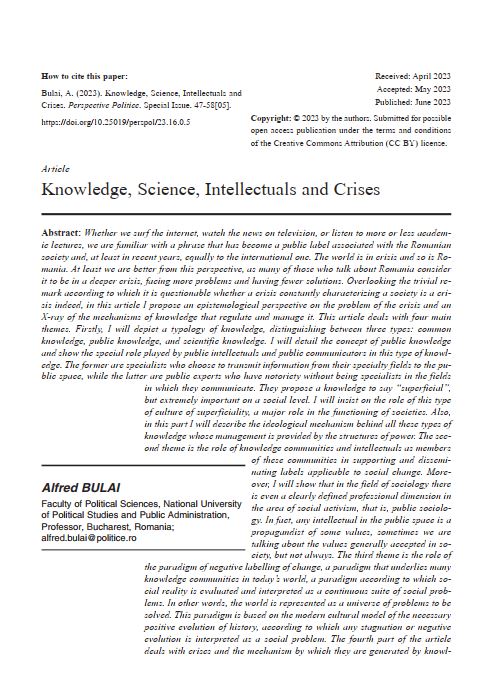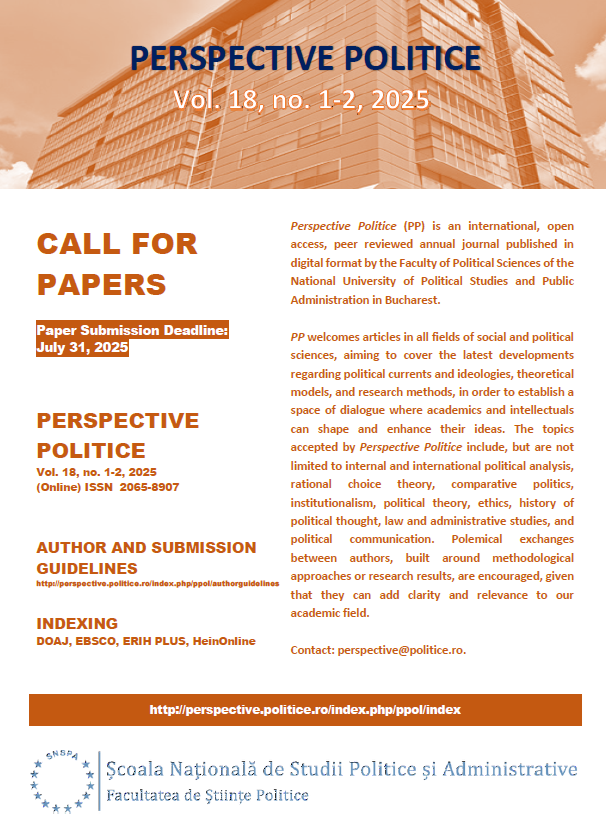Knowledge, Science, Intellectuals and Crises
Abstract
Whether we surf the internet, watch the news on television, or listen to more or less academic lectures, we are familiar with a phrase that has become a public label associated with the Romanian society and, at least in recent years, equally to the international one. The world is in crisis and so is Romania. At least we are better from this perspective, as many of those who talk about Romania consider it to be in a deeper crisis, facing more problems and having fewer solutions. Overlooking the trivial remark according to which it is questionable whether a crisis constantly characterizing a society is a crisis indeed, in this article I propose an epistemological perspective on the problem of the crisis and an X-ray of the mechanisms of knowledge that regulate and manage it. This article deals with four main themes. Firstly, I will depict a typology of knowledge, distinguishing between three types: common knowledge, public knowledge, and scientific knowledge. I will detail the concept of public knowledge and show the special role played by public intellectuals and public communicators in this type of knowledge. The former are specialists who choose to transmit information from their specialty fields to the public space, while the latter are public experts who have notoriety without being specialists in the fields in which they communicate. They propose a knowledge to say “superficial”, but extremely important on a social level. I will insist on the role of this type of culture of superficiality, a major role in the functioning of societies. Also, in this part I will describe the ideological mechanism behind all these types of knowledge whose management is provided by the structures of power. The second theme is the role of knowledge communities and intellectuals as members of these communities in supporting and disseminating labels applicable to social change. Moreover, I will show that in the field of sociology there is even a clearly defined professional dimension in the area of social activism, that is, public sociology. In fact, any intellectual in the public space is a propagandist of some values, sometimes we are talking about the values generally accepted in society, but not always. The third theme is the role of the paradigm of negative labelling of change, a paradigm that underlies many knowledge communities in today’s world, a paradigm according to which social reality is evaluated and interpreted as a continuous suite of social problems. In other words, the world is represented as a universe of problems to be solved. This paradigm is based on the modern cultural model of the necessary positive evolution of history, according to which any stagnation or negative evolution is interpreted as a social problem. The fourth part of the article deals with crises and the mechanism by which they are generated by knowledge communities, as well as their main characteristics. Finally, I am trying to answer the question of why crises cannot be solved.

Downloads
Published
Issue
Section
License
Copyright (c) 2023 Alfred BULAI

This work is licensed under a Creative Commons Attribution-NonCommercial-ShareAlike 4.0 International License.



